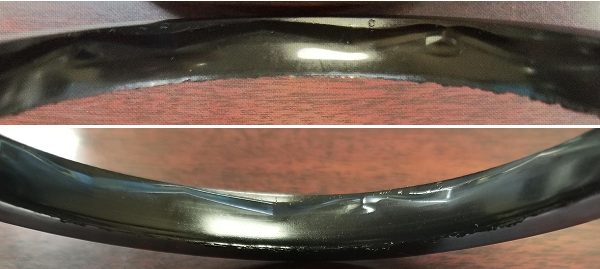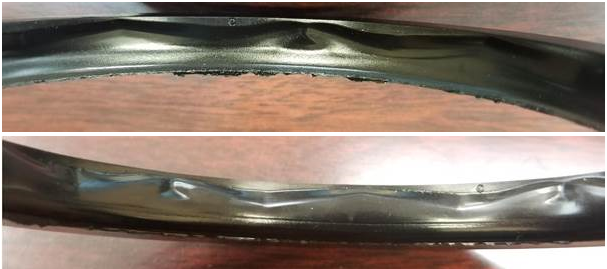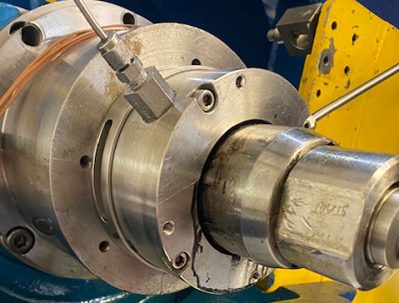Introduction to Extra Wide mud motor seals
The Extra Wide Hybrid Seal™ was developed so that oilfield mud motor sealed bearing assemblies can benefit from the advantages of a much wider dynamic sealing lip. The advantages include increased structural strength and pressure capacity, and additional sacrificial material to accommodate wear mechanisms such as extrusion damage and abrasive wear.
For such a seal to be useful in oilfield mud motors, it must have about the same hydrodynamic pumping rate as a Wide Footprint Kalsi Seal™, so that lubricant consumption is compatible with existing lubricant reservoir volume and enough hydrodynamic lubrication is provided to accommodate the wider dynamic lip. This design objective was achieved by combining Enhanced Lubrication (EL) waves with zigzag waves.
Testing Extra Wide mud motor seals at 2,500 psi
A Mud motor could handle higher differential pressure if the pressure retaining seal is placed between radial bearings, to limit shaft deflection at the seal and allow a relatively small mandrel-to-housing extrusion gap clearance. We recently completed testing Extra Wide mud motor seals to gain some preliminary insight into what might be possible with such a design.
First test — A pair of 2.75” (69.85mm) PN 756-1-11 Extra Wide Type C Hybrid seals were tested at 2,500 psi (17.24 MPa) with an IS0 460 viscosity grade lubricant. The rotary speed was 347 rpm, which equates to 250 sfpm (1.27 m/s). The radial extrusion gap clearance between the rotating mandrel and the seal housing was 0.010” (0.254mm). The test was conducted with a mandrel that was machined eccentrically, to provide 0.010” to 0.012” (0.254 to 0.305mm) of intentional runout, FIM. The bulk lubricant temperature of the ISO 460 viscosity grade lubricant ranged from about 279 to 294°F (137.2 to 145.6°C) and averaged about 285°F (140.6°C).
The total run time of the test was 104.12 hours with 93.02 hours at 2,500 psi (17.24 MPa). The final 11.1 hours of the test conducted with negligible pressure, due to a test fixture issue. The hydrodynamic pumping related leak rate ranged from 0.120 to 0.294 ml/hour for the pair of seals.
The used test seals are in good condition, as shown by Figure 1.
The seals have mild extrusion damage. The dynamic surfaces of the seals are in good condition and were adequately lubricated during operation. This level of performance is made possible by the strength provided by the wide dynamic lip and the lubrication provided by the hydrodynamic waves.
Second test — A second pair of PN 756-1-11 Extra Wide Type C Hybrid seals were tested under the same conditions of pressure, speed, lubricant viscosity, and mandrel runout. The average bulk lubricant temperature was maintained at about 293°F (145°C), and the hydrodynamic pumping related leak rate for the pair of rotary seals was about 0.168 ml/hour.
The test was stopped after 72 hours to inspect seal condition. The used seals are shown in Figure 2. While not perfect, they are in surprisingly good condition considering the high pressure, relatively large extrusion gap clearance, mandrel runout, and high temperature. The fixture used to conduct both of the high pressure rotary seal tests is shown in Figure 3.
Extra Wide mud motor seal availability
Extra Wide Type C Hybrid Seals are currently available in five different diameters. New sizes can be manufactured to fit any mud motor mandrel diameter. Contact our staff for additional information, or to order these highly capable mud motor seals.




